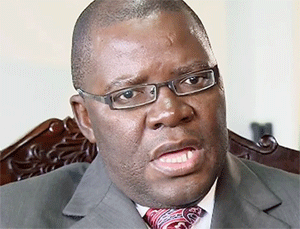
THE Ministry of Finance has concluded drafting legislation to liberate the Reserve Bank of Zimbabwe (RBZ) of its US$1,1 billion debt in the last leg of reforms at the institution.
REPORT BY OUR STAFF The legislation is among a raft of measures designed to bring sanity to the banking sector.
Finance minister, Tendai Biti, said last week that he would present to cabinet the RBZ Restructuring Act in two weeks’ time.
“As long as the debt is there, capitalising the central bank becomes academic unless you are going to find US$2 billion that swallows the US$1,1 billion debt. We therefore have to liberate the central bank balance sheet of this debt,” Biti said.
The government would create a Special Purpose Vehicle to take over the debt.
Biti said the bifurcation (splitting) of the balance sheet and a new instrument that would take over the banks’ indebtedness would make banks operate without any hindrances.
Government plans to take over non-performing loans of banks via a US$1 billion syndicated fund, taking a leaf from Asset Management Company of Nigeria, credited for restoring sanity into the west African nation’s banking sector. A 10-year bond would be issued.
A draft bill has been crafted and the ministry is consulting all the stakeholders — RBZ, World Bank, IMF and bankers — to have a buy-in before the bill is presented before cabinet.
- Chamisa under fire over US$120K donation
- Mavhunga puts DeMbare into Chibuku quarterfinals
- Pension funds bet on Cabora Bassa oilfields
- Councils defy govt fire tender directive
Keep Reading
RBZ is constrained by debt and lost its assets after some of the creditors obtained writs of execution to attach the central bank’s assets.
In 2010, government then moved swiftly to protect the assets by invoking the Presidential Powers (Temporary Measures) Act, to protect the RBZ’s assets from being attached by various creditors as the bank was incapacitated to repay the outstanding amounts.
Biti blasted banks’ voodoo practices, saying the high interest rates and huge levels of non-interest income were manifest in the form of bank charges and service fees.
He said the time of talking was over and government would come hard on the banks.
“Within the course of the next few days, we are going to come up with corrective measures that ensure that banks stick to normal banking practices, where returns are less than 7%, not the exploitative returns that we have seen,” Biti said.
Banks have been accused of ripping off clients by levying interest rates as high as 30% at a time annual inflation is below 5%. They have also been accused of penalising clients through high bank charges and service fees.
Bankers argue that the accusations were unjustified, as there were no short-term instruments on the market to set the benchmark interest rates as well as the liquidity constraints.
Banking act overhaul on cards
Biti said major amendments to the Banking Act were on the cards to completely overhaul the legislation.
In April, Biti hinted that amendments to the Act would look at oversight, stress tests, capital requirements and corporate governance, among others.
He said it was anomalous for owners to simultaneously be managers in the banking sector.
“That has to stop. If you are a shareholder, go and play golf and let other people run the bank for you, both at management and board level,” Biti said in April.











